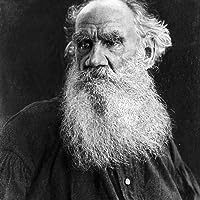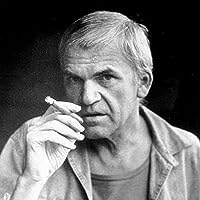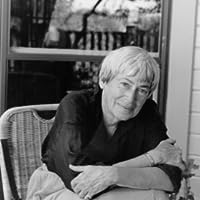Tolstoy Quotes
Quotes tagged as "tolstoy"
Showing 91-120 of 135

“The worst feature of the Common Core is its anti-humanistic, utilitarian approach to education. It mistakes what a child is and what a human being is for. That is why it has no use for poetry, and why it boils the study of literature down to the scrambling up of some marketable "skill" [...] you don't read good books to learn about what literary artists do...you learn about literary art so that you can read more good books and learn more from them. It is as if Thomas Gradgrind had gotten hold of the humanities and turned them into factory robotics.”
―
―
“The endless ocean was his sole companion , and on some deeply sentimental level, it seemed sufficient. Almost apt. He aligned himself with Thoreau and Tolstoy, he felt like their peers. The kinship with nature devoted humans to a mythical state, a heightened persona beyond the reach of mere mortals. At least that was what he told himself on the lonely nights when insomnia played on his fears and the howling wind pierced through his soul.”
― Consequence
― Consequence

“Death, the inevitable end of everything, confronted him for the first time with irresistible force. And that Death which was present in this dear brother (who, waking up, moaned and by habit called indiscriminately on God and on the devil) was not so far away as it hitherto seemed to be. It was within himself to- he felt it. If not today, then tomorrow or thirty years hence, was it not all the same? But what that inevitable Death was, he not only did not know, not only had never considered, but could not and dared not consider.”
―
―

“Every novel says to the reader: “Things are not as simple as you think.” That is the novel’s eternal truth, but it grows steadily harder to hear amid the din of easy, quick answers that come faster than the question and block it off. In the spirit of our time, it’s either Anna or Karenin who is right, and the ancient wisdom of Cervantes, telling us about the difficulty of knowing and the elusiveness of truth, seems cumbersome and useless.”
― The Art of the Novel
― The Art of the Novel

“Anna Mikhaylovna was already embracing her and weeping. The countess wept too. They wept because they were friends, and because they were kindhearted, and because they - friends from childhood - had to think about such a base thing as money, and because their youth was over.... But those tears were pleasant to them both.”
―
―

“I often think with regret of that fresh, beautiful feeling of boundless, disinterested love which came to an end without having ever found self-expression or return. It is strange how, when a child, I always longed to be like grown-up people, and yet how I have often longed, since childhood's days, for those days to come back to me!”
― Childhood
― Childhood

“Tolstoy was perfectly right to protest that history is not made to happen by the combination of such obscure entities as the ‘power’ or ‘mental activity’ assumed by naïve historians; indeed he was, in Kareev’s view, at his best when he denounced the tendency of metaphysically minded writers to attribute causal efficacy to, or idealise, such abstract entities as ‘heroes’, ‘historic forces’, ‘moral forces’, ‘nationalism’, ‘reason’ and so on, whereby they simultaneously committed the two deadly sins of inventing non-existent entities to explain concrete events and of giving free reign to personal, or national, or class, or metaphysical bias.”
― The Hedgehog and the Fox: An Essay on Tolstoy's View of History
― The Hedgehog and the Fox: An Essay on Tolstoy's View of History

“This, for both Schopenhauer and Tolstoy, is the central tragedy of human life; if only men would learn how little the cleverest and most gifted among them can control, how little they can know of all the multitude of factors the orderly movement of which is the history of the world; above all, what presumptuous nonsense it is to claim to perceive an order merely on the strength of believing desperately that an order must exist, when all one actually perceives is meaningless chaos –a chaos of which the heightened form, the microcosm in which the disorder of human life is reflected in an intense degree, is war.”
― The Hedgehog and the Fox: An Essay on Tolstoy's View of History
― The Hedgehog and the Fox: An Essay on Tolstoy's View of History

“Happiness consists of living each day as if it were the first day of your honeymoon and the last day of your vacation.”
―
―

“If I were forced to compare Tolstoy with Dickens, I should say that Tolstoy’s appeal will probably be wider in the long run, because Dickens is scarcely intelligible outside the English-speaking culture; on the other hand, Dickens is able to reach simple people, which Tolstoy is not. Tolstoy's characters can cross a frontier, Dickens's can be portrayed on a cigarette-card. But one is no more obliged to choose between them than between a sausage and a rose.”
― George Orwell: Selected Writings
― George Orwell: Selected Writings

“[Tolstoy] denounced [many historians'] lamentable tendency to simplify. The experts stumble onto a battlefield, into a parliament or public square, and demand, "Where is he? Where is he?" "Where is who?" "The hero, of course! The leader, the creator, the great man!" And having found him, they promptly ignore all his peers and troops and advisors. They close their eyes and abstract their Napoleon from the mud and the smoke and the masses on either side, and marvel at how such a figure could possibly have prevailed in so many battles and commanded the destiny of an entire continent. "There was an eye to see in this man," wrote Thomas Carlyle about Napoleon in 1840, "a soul to dare and do. He rose naturally to be the King. All men saw that he was such."
But Tolstoy saw differently. "Kings are the slaves of history," he declared. "The unconscious swarmlike life of mankind uses every moment of a king's life as an instrument for its purposes." Kings and commanders and presidents did not interest Tolstoy. History, his history, looks elsewhere: it is the study of infinitely incremental, imperceptible change from one state of being (peace) to another (war).
The experts claimed that the decisions of exceptional men could explain all of history's great events. For the novelist, this belief was evidence of their failure to grasp the reality of an incremental change brought about by the multitude's infinitely small actions.”
― Thinking In Numbers: On Life, Love, Meaning, and Math
But Tolstoy saw differently. "Kings are the slaves of history," he declared. "The unconscious swarmlike life of mankind uses every moment of a king's life as an instrument for its purposes." Kings and commanders and presidents did not interest Tolstoy. History, his history, looks elsewhere: it is the study of infinitely incremental, imperceptible change from one state of being (peace) to another (war).
The experts claimed that the decisions of exceptional men could explain all of history's great events. For the novelist, this belief was evidence of their failure to grasp the reality of an incremental change brought about by the multitude's infinitely small actions.”
― Thinking In Numbers: On Life, Love, Meaning, and Math

“What better time is there in our lives than when the two best of virtues-innocent gaiety and a boundless yearning for affection-are our sole objects of pursuit?”
― Childhood
― Childhood

“Yaşam tarzım, sizin hoşunuza gidebilir ya da gitmeyebilir, ama benim için hiç fark etmez, beni tanımak istiyorsanız saygı göstermek zorundasınız" anlamı taşıyan soğuk ve mağrur bir tavır takınmıştı.”
― Anna Karenina
― Anna Karenina

“Se detuvo y contempló las copas de los álamos, mecidas por el viento,con sus hojas mojadas y relucientes bajo el sol frío, y comprendió que no la perdonarían, que todo el mundo sería inmisericorde con ella,como ese cielo y ese follaje.”
―
―

“Cualquier acto de un loco, de un borracho o de un hombre excitado se presenta, ante los ojos de quien conoce el estado de ánimo del autor del hecho, como menos libre y más sujeto a las leyes de la necesidad, y más libre y menos sometido a la necesidad a juicio de quien no lo conoce.”
― War and Peace
― War and Peace

“If you want to consume the cream of Christ's philosophy, then don't read the Bible, read Tolstoy.”
―
―

“Only a handful of individuals in human history can be truly hailed as Christians, such as Tolstoy, Gandhi, Mother Teresa, Rumi, Martin Luther King Jr. and a few others.”
― Neurons of Jesus: Mind of A Teacher, Spouse & Thinker
― Neurons of Jesus: Mind of A Teacher, Spouse & Thinker

“Ultimately it is the Christian attitude which is self-interested and hedonistic, since the aim is always to get away from the painful struggle of earthly life and find eternal peace in some kind of Heaven or Nirvana. The humanist attitude is that the struggle must continue and that death is the price of life.”
― Inside the Whale and Other Essays
― Inside the Whale and Other Essays

“Not having yet passed through those bitter experiences which enforce upon older years circumspection and coldness, I deprived myself of the pure delight of a fresh, childish instinct for the absurd purpose of trying to resemble grown-up people.”
― Childhood
― Childhood

“I know that I am going to meet a personal variation on reality; a partial view of reality. But I know also that by that partiality, that distancing from the shared experience, it will be new: a revelation. It will be a vision, a more or less powerful or haunting dream. A space-voyage through somebody else's psychic abysses. It will fall short of tragedy, because tragedy is the truth, and truth is what the very great artists, the absolute novelists, tell. It will not be truth; but it will be imagination. Truth is best. For it encompasses tragedy and partakes of the eternal joy. But very few of us know it; the best we can do is recognize it. Imagination - to me - is the next best. For it partakes of Creation, which is one aspect of the eternal joy.
All the rest is either Politics or Pedantry, or Mainstream Fiction, may it rest in peace.”
―
All the rest is either Politics or Pedantry, or Mainstream Fiction, may it rest in peace.”
―

“...And there really are men who believe in this, who spend their time in promoting Leagues of Peace, in delivering addresses, and in writing books; and of course the governments sympathize with it all, pretending that they approve of it; just as they pretend to support temperance, while they actually derive the larger part of their income from intemperance; just as they pretend to maintain liberty of the constitution, when it is the absence of liberty to which they owe their power; just as they pretend to care for the improvement of the laboring classes, while on oppression of the workman rest the very foundations of the State; just as they pretend to uphold Christianity, when Christianity is subversive of every government.”
― The Kingdom of God Is Within You
― The Kingdom of God Is Within You

“Тихая, уединенная жизнь в нашей деревенской глуши, с возможностью делать добро людям, которым так легко делать добро, к которому они не привыкли; потом труд, – труд, который, кажется, что приносит пользу; потом отдых, природа, книга, музыка, любовь к близкому человеку, – вот мое счастье, выше которого я не мечтал.”
―
―

“[Tolstoy] does not necessarily get rid of [his angry] temperament by undergoing religious conversion, and indeed it is obvious that the illusion of having been reborn may allow one's native vices to flourish more freely than ever, though perhaps in subtler forms.”
―
―
“Требования, которые он предъявлял к началу произведения, Толстой высказал однажды в связи с работой над романом о декабристах: для начала должна быть найдена такая обстановка, чтобы из нее, «как из фонтана», разбрызгивалось действие «в разные места, где будут играть роль разные лица». Таким «фонтаном» оказался вечер в придворном салоне, в котором, по позднейшему определению Толстого, как нигде, «высказывался так очевидно и твердо градус политического термометра, на котором стояло настроение придворного легитимистского петербургского общества» [25].”
― «Война и мир» Л. Н. Толстого: создание великой книги
― «Война и мир» Л. Н. Толстого: создание великой книги
“In Russia, the person who put Sevastopol on the literary map was Leo Tolstoy, a veteran of the siege. His fictionalized memoir The Sebastopol Sketches made him a national celebrity. Already with the first installment of the work published, Tsar Alexander II saw the propaganda value of the piece and ordered it translated into French for dissemination abroad. That made the young author very happy. Compared with Tolstoy’s later novels, The Sebastopol Sketches hasn’t aged well, possibly because this is not a heartfelt book. As the twenty-six-year-old Tolstoy’s Sevastopol diaries reveal, not heartache but ambition drove him at the time. Making a name as an author was just an alternative to two other grand plans—founding a new religion and creating a mathematical model for winning in cards (his losses during the siege were massive even for a rich person).”
― The Crimean Nexus: Putin’s War and the Clash of Civilizations
― The Crimean Nexus: Putin’s War and the Clash of Civilizations
“Through the decade of the 1880s and into the early 1890s, Tolstoy and Fedorov met many times, and Tolstoy frequently refers to him in his letters and notebooks. For Tolstoy these were years of spiritual unrest. Never a complacent person unaware of his own self-development, Tolstoy in the late 1870S and early 1880s was passing through a stage of especially intense spiritual torment and particularly ruthless self-examination. His earlier religious faith, never terribly strong, had collapsed utterly, and he was seeking a new faith to live by. That he could not live a life strictly consistent with his deeply felt (and widely publicized) principles had always troubled him, and now tormented him. He had turned against the ideal of family life that he had so memorably depicted in War and Peace, but he still lived as-and at times very much enjoyed being-a family man. Theoretically he had turned against his own social class and against all art that did not illustrate some simple moral truth-and yet his biographers give us a charming picture of Tolstoy at age fifty and his old aesthetic and ideological enemy Turgenev, age sixty, sitting at opposite ends of a child's teeter-totter, seesawing up and down as children from the neighborhood laugh and applaud. Even during his famous "peasant" phase, in which he allowed himself to be portrayed by the artist Repin à la moujik behind a plow, we learn from his wife's diary that under his peasant smock he always wore silk underwear.”
― The Russian Cosmists: The Esoteric Futurism of Nikolai Fedorov and His Followers
― The Russian Cosmists: The Esoteric Futurism of Nikolai Fedorov and His Followers

“The same Sermon on the Mount that influenced Tolstoy to write “The Kingdom of God is Within You”, inspired me to a great extent in my work “Principia Humanitas”.”
― We Are All Black: A Treatise on Racism
― We Are All Black: A Treatise on Racism

“Tsar Alexander I was prone to tears and he did weep over Borodino, but not at Borodino, as Tolstoy would have it. This was definitely poetic licence. Alexander was never on the field at Borodino.”
― Be My Wolff
― Be My Wolff
All Quotes
|
My Quotes
|
Add A Quote
Browse By Tag
- Love Quotes 97k
- Life Quotes 75.5k
- Inspirational Quotes 72.5k
- Humor Quotes 43.5k
- Philosophy Quotes 29.5k
- Inspirational Quotes Quotes 27k
- God Quotes 26k
- Truth Quotes 23.5k
- Wisdom Quotes 23.5k
- Romance Quotes 23k
- Poetry Quotes 22k
- Death Quotes 20k
- Happiness Quotes 18.5k
- Life Lessons Quotes 18.5k
- Hope Quotes 18k
- Faith Quotes 18k
- Quotes Quotes 16.5k
- Inspiration Quotes 16.5k
- Spirituality Quotes 15k
- Religion Quotes 15k
- Motivational Quotes 15k
- Writing Quotes 14.5k
- Relationships Quotes 14.5k
- Life Quotes Quotes 14k
- Love Quotes Quotes 13.5k
- Success Quotes 13.5k
- Time Quotes 12.5k
- Motivation Quotes 12k
- Science Quotes 11.5k
- Knowledge Quotes 11k

